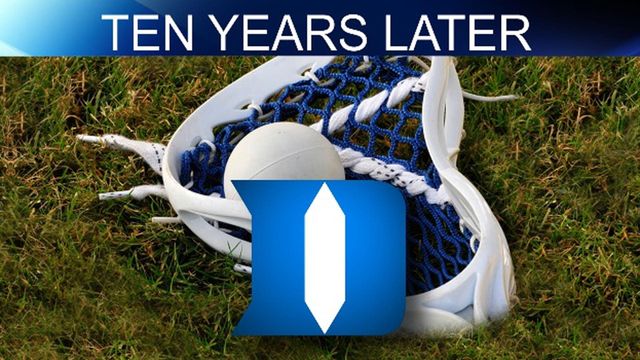Decade later, 'Duke lacrosse' still resonates in Durham
A tidy new home now sits on the spot in Durham that became the focal point a decade ago of a national debate on race, sex, privilege and the American justice system.
Posted — UpdatedA black woman working as a stripper at an off-campus party for the Duke University lacrosse team alleged three white players attacked and raped her in a bathroom on March 13, 2006.
The claim sparked protests at Duke and in Durham streets and prompted soul-searching among university administrators. Players Dave Evans, Collin Finnerty and Reade Seligmann were eventually charged in the case, the rest of the team was publicly vilified and lacrosse coach Mike Pressler was forced to resign.
"The history where crimes against African-Americans were not taken seriously by authorities kind of guided their response, so they were outraged," Irving Joyner, a law professor at the historically black North Carolina Central University in Durham, where the accuser in the case, Crystal Mangum, was a student, said recently of the protests.
"It was almost like 24/7 comments that you could switch on any channel and someone was talking about the Duke lacrosse case," Durham Mayor Bill Bell said recently. "You probably had the level of tension you’d expect from a situation like that."
"Durham at that time was a two-tiered city – black-white, wealthy-working poor," Joe Cheshire, an attorney for the accused lacrosse players, said recently. "That particular case tore that city apart."
As "Duke lacrosse" became national shorthand for brutish, class-based crime, Mike Nifong, who was Durham County district attorney at the time, quickly convicted the players in the media.
"I will not allow Durham's view in the eyes of the world to be a bunch lacrosse players from Duke raping a black girl in Durham," Nifong said at a public forum.
A year later, Durham was a laughingstock in the eyes of the world when the whole case was found to be, in Evans' words, "fantastic lies."
Crystal Mangum, the alleged victim, changed her account of the crime so many times that she was no longer credible, and DNA tests confirmed no rape had occurred.
Attorney General Roy Cooper, whose office took over investigation of the case when Nifong was accused of withholding evidence from defense attorneys, dropped all charges in the case in April 2007 and declared the three players innocent, saying they were victims of a "tragic rush to accuse."
Suddenly, "Duke lacrosse" became national shorthand for an uneven criminal justice system.
"I think we learned, or re-learned, a lot about the presumption of innocence in the Duke lacrosse case," Cheshire said. "We learned that you can’t fit your world view into criminal justice. We learned that you simply can’t take the word of a prosecutor or a police officer and simply believe it.
"We learned that wealthy people are treated differently than poor people," he continued. "I believe, if the Duke lacrosse players had been three poor people – black, white, Hispanic – that they may still be in prison today. In the criminal justice system, you have to pay attention to make sure people get good representation and don’t get rolled over by the authorities."
Nifong was later disbarred for his conduct. He couldn't be reached for comment.
"It became very clear to a lot of people how the prosecutor's office can abuse the power they have," said Joyner, who noted he sometimes uses the case to illustrate points in his law classes.
The case also highlighted the strained town-gown relationship between Duke and Durham. Since then, the school has tried to strengthen that relationship, including creating the position of vice president for Durham and regional affairs in 2008.
"I think we’re in a much better position in terms of Duke-Durham partnership," Bell said. "I think we as a community were big enough to get over and move on. The people in Durham have come together and moved on to deal with more positive things in the community."
Duke President Richard Brodhead declined to comment for this story.
Evans, Finnerty and Seligmann sued Duke and Durham over their treatment. They reached a confidential settlement with the school and, under the terms of their 2014 settlement with the city, Durham donated $50,000 to the North Carolina Innocence Inquiry Commission.
None of the players could be reached for comment.
Cheshire said there continue to be problems with the justice system, but the Duke lacrosse case has prompted some changes.
"I think prosecutors now have a tendency to be afraid of jumping too fast. I think they’re more thoughtful," he said. "I think defense lawyers have learned to contest more, but in a reasonable kind of way. I think police – they got embarrassed terribly – I think they’ve learned don’t just jump to those conclusions.
"Even if it helps a small percentage of those who go through the system, it’s been a positive benefit," he said.
• Credits
Copyright 2024 by Capitol Broadcasting Company. All rights reserved. This material may not be published, broadcast, rewritten or redistributed.






